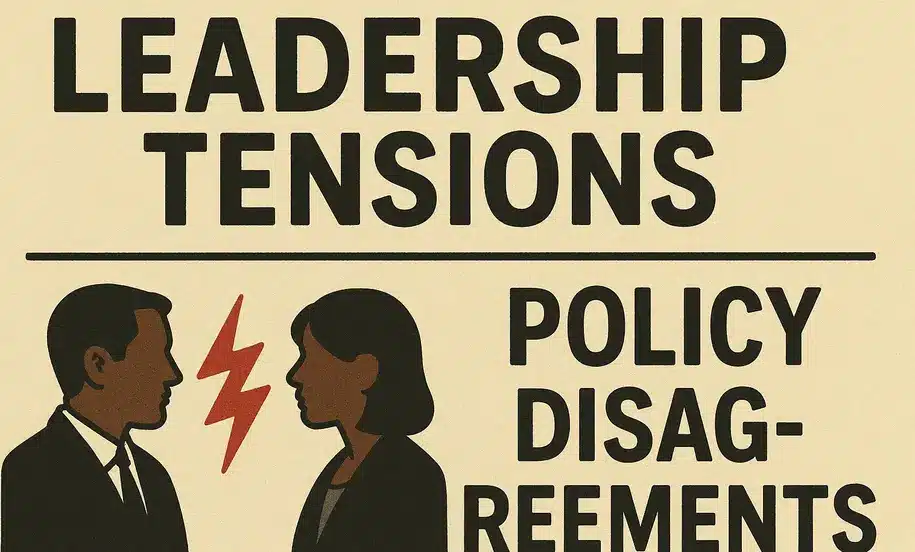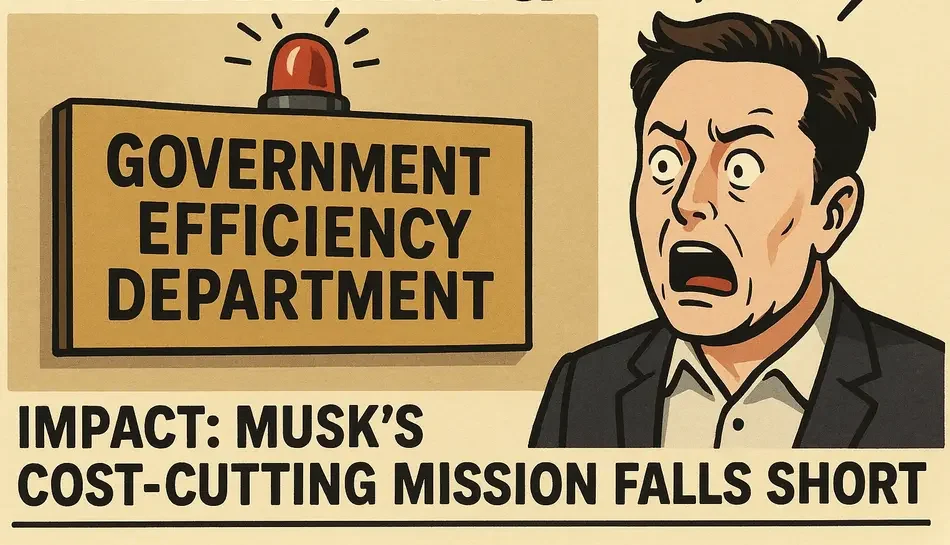Elon Musk Exits Government Efficiency Department After Controversial Tenure
Elon Musk’s tenure leading the Department of Government Efficiency (DOGE) has officially ended, with the government efficiency department impact falling significantly short of initially promised targets. After bold claims of slashing $2 trillion from federal spending, official estimates now suggest actual government efficiency department impact may amount to just $116 billion in savings this year – with independent analyses placing the figure closer to $30 billion annually.
“We are relentlessly pursuing millions of dollars in waste,” Musk stated during his time at DOGE, but his departure comes without substantial evidence to support these broad assertions about government efficiency department impact.
Disputed Results and Exaggerated Claims
The government efficiency department impact remains contentious as experts scrutinize Musk’s data. Critics argue the numbers contain exaggerated savings and unverifiable information, calling into question the entire initiative’s effectiveness. Despite this, the department’s actions resulted in thousands of federal employees being laid off and several agencies shuttered.
President Trump acknowledged during Musk’s farewell that many of the promised government efficiency department impact results “will come later,” suggesting the administration still intends to pursue Musk’s initiatives despite his departure.
Table of Contents
Conflicts of Interest Cloud Assessment
The full government efficiency department impact is difficult to measure given multiple potential conflicts of interest surrounding Musk’s dual roles as both cost-cutter and government contractor.
Business Dealings During Government Service
While leading efforts to improve government efficiency, department impact analyses show Musk’s companies secured lucrative opportunities. Several business arrangements with Asian companies and Middle Eastern nations were announced while Musk accompanied President Trump on international trips.
Over the past two decades, Musk’s companies have received approximately $40 billion in government contracts, raising questions about the objectivity of the government efficiency department impact assessment when the person leading the cuts also stands to benefit from federal spending.
Leadership Tensions and Policy Disagreements
The government efficiency department impact has been hampered by apparent conflicts between Musk and other administration officials, including cabinet members. Notably, Musk publicly criticized the administration’s major spending bill, saying he was “disappointed to see the massive spending bill, frankly which increases the deficit and undermines the work that the DOGE team has been doing.”
This rare public disagreement highlighted the challenges in implementing meaningful government efficiency department impact while balancing competing priorities within the administration.

Legal Challenges to Department Actions
Many of the government efficiency department impact initiatives now face legal hurdles:
• 12% of the federal workforce was targeted for elimination
• Multiple terminations have been challenged in court
• Some fired employees have been rehired following legal proceedings
• Agencies like USAID and Voice of America were particularly affected
According to Government Accountability Office standards, efficiency measures must be implemented with proper legal authority and procedural safeguards – requirements critics argue were not consistently met.
Future Government Reform Outlook
Despite Musk’s official departure due to time limits for special government employees, the government efficiency department impact is expected to continue under the team he assembled. President Trump has indicated he intends to have these efforts “codified by Congress,” suggesting institutional permanence for the initiative.
For those working in or with government agencies, understanding these changes is crucial. The government efficiency department impact will likely influence:
1. Federal hiring practices and job security
2. Agency funding and program continuity
3. Government career opportunities
4. Contractor relationships with federal agencies
5. Implementation of workplace policies
The job market for federal positions may remain volatile as the government efficiency department impact continues to unfold under new leadership.
According to Brookings Institution analysis, government reform efforts typically require 3-5 years to demonstrate measurable results – suggesting the full government efficiency department impact may not be evident until well into the administration’s term.
What was the promised government efficiency department impact on federal spending?
The promised government efficiency department impact included slashing $2 trillion from federal spending, though this target was later reduced to $116 billion for the current fiscal year. Independent analysts suggest the actual government efficiency department impact may be closer to $30 billion annually, representing a significant shortfall from original projections. These numbers remain contested as they include what critics describe as exaggerated savings and unverifiable data points.
How has the government efficiency department impact affected federal employees?
The government efficiency department impact on federal employees has been substantial, with approximately 12% of the federal workforce targeted for elimination. Many of these terminations have faced legal challenges, with some employees being rehired following court proceedings. Agencies particularly affected by the government efficiency department impact include USAID and Voice of America, which saw significant personnel reductions and operational changes during this initiative.
Will the government efficiency department impact continue after Musk’s departure?
Yes, the government efficiency department impact is expected to continue despite Musk’s official departure due to time limits for special government employees. President Trump has indicated he plans to have the department’s efforts “codified by Congress,” suggesting a more permanent institutional status for the initiative. Most DOGE team members are expected to remain in place, ensuring continuity in the government efficiency department impact as they pursue further cost-cutting measures across federal agencies.
What controversies surrounded the government efficiency department impact assessment?
The government efficiency department impact assessment faced several controversies, most notably potential conflicts of interest involving Elon Musk’s dual roles as both cost-cutter and government contractor. With Musk’s companies receiving approximately $40 billion in government contracts over two decades, questions arose about the objectivity of government efficiency department impact initiatives. Additionally, business arrangements with international entities were announced while Musk traveled with President Trump, raising further concerns about the relationship between official duties and private business interests.




